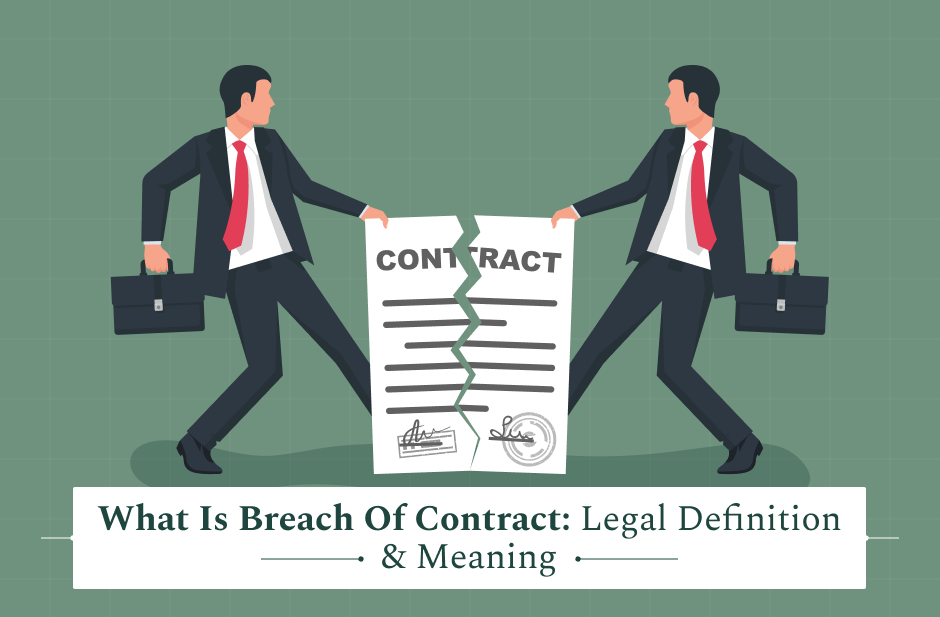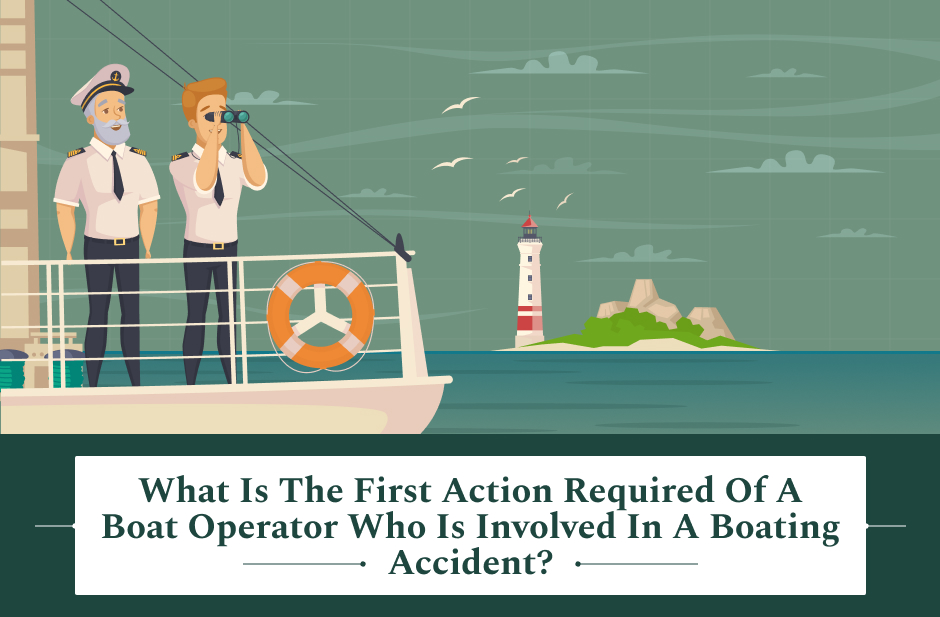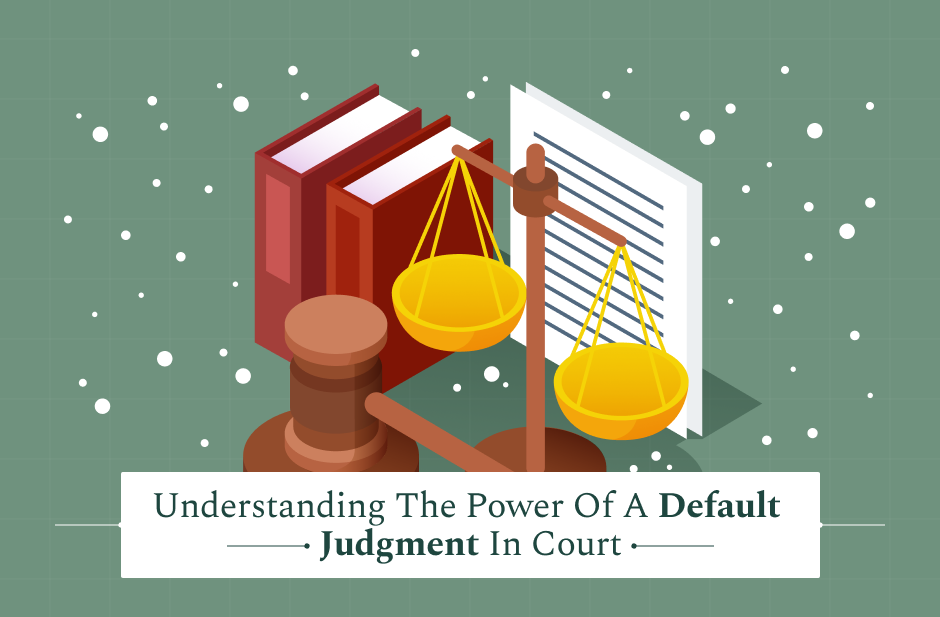Contracts are essential elements in both business and private transactions. Irrespective of whether you’re hiring a contractor to remodel your house, signing a contract of employment, or forming a partnership agreement with a business associate, you should have a contract so that everyone understands their responsibilities.
But what happens when one side fails to satisfy those responsibilities? This is when the law gets involved in a “breach of contract.”
In this article, I will explain the following things:
- What is a breach of contract?
- Types of breach of contract.
- Key aspects of a breach of contract.
- How does it happen?
- What is the legal impact of a breach of contract?
Additionally, I will also talk about some of the questions that people also ask about contractual breaches. Therefore, if these are some of the things that you want to know, keep on reading this blog till the end…
What Is Breach Of Contract?
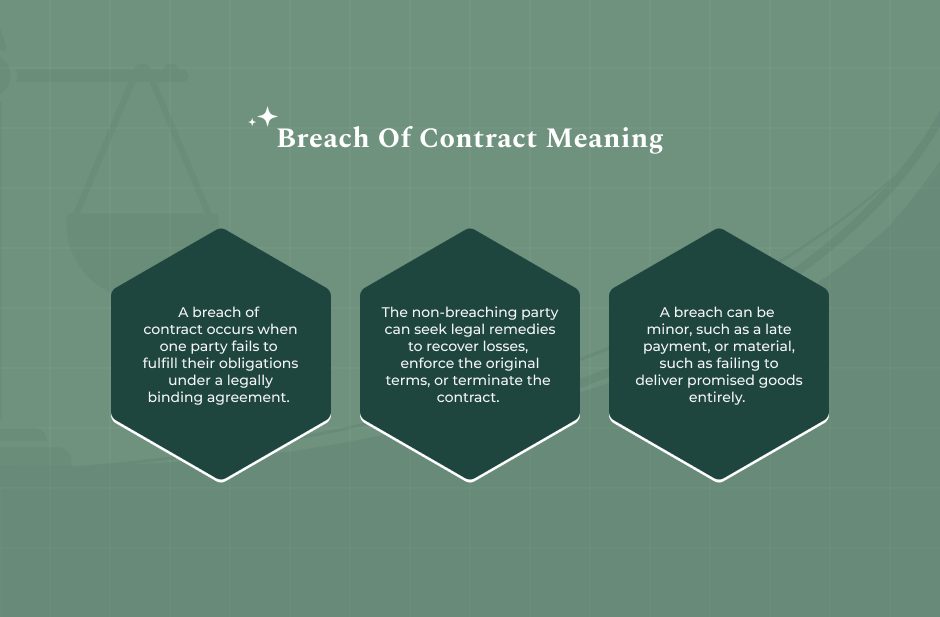
A breach of contract occurs when one party fails to fulfill their part of a legally binding agreement, without a valid legal excuse. The breach can involve:
- Non-performance (failing to do what was promised).
- Defective performance (doing it incorrectly).
- Delayed performance (doing it too late).
According to the Restatement (Second) of Contracts §235, “when performance of a duty under a contract is due, any non-performance is a breach.” Courts generally evaluate whether the breach is material (serious enough to undermine the contract) or minor (less severe but still actionable).
For example, if a web developer fails to deliver a finished website by the agreed date, that could be a breach. If the website is delivered but with small errors, it may be a minor breach.
What Are The Types Of Breach Of Contract?
“A breach of contract occurs whenever a party who entered a contract fails to perform their promised obligations,” according to the Legal Information Institute. Now, considering there are several types of contracts, the types of breaches can also vary.
There are four primary types of breach:
| Type of Breach | Definition | Example |
| Material Breach | A major failure that defeats the purpose of the agreement. | A supplier delivers completely different goods than agreed upon. |
| Minor Breach | A partial or less serious failure that does not undermine the entire contract. | A contractor finishes work but misses small agreed-upon details. |
| Anticipatory Breach | When a party indicates they will not fulfill their contractual duty in advance. | An employee tells their employer they won’t show up for a project before the due date. |
| Actual Breach | When one party simply fails to perform their duty as agreed. | A tenant refuses to pay rent despite having signed a lease. |
What Are The Key Aspects Of A Breach Of Contract?
For a breach to be recognized in court, several elements must be present:
- A Valid Contract Exists: Written, oral, or implied. The agreement must meet the requirements of offer, acceptance, and consideration.
- Performance by the Plaintiff: The plaintiff must show they upheld their end (or were ready and willing to).
- Breach by the Defendant: Clear proof that the other party failed in their obligations.
- Damages Resulted: The plaintiff suffered a financial or measurable loss.
How Does A Breach Of Contract Happen?
When one party fails to perform the acts that are predictable and defined in the contract without legal justification, that action is a breach of contract. That broken promise constitutes a cause of action or allows a party to sue for the breach in the proper court.
The breach of contract can take multiple forms. The most common are the non-delivery of specified legal or commercial goods/services, failing to complete the work in a timely manner, defective work or product being delivered, or refusal to pay on time for individuals or companies that render goods/services.
Breaches can occur in all of the following ways:
- Failure to deliver goods or services.
- Failure to pay on time.
- Disputed defective work.
- Refusal to perform the obligations altogether.
Occasionally, breaches have happened, and litigation arises out of the murky language in the contract or a misunderstanding of what the parties thought the terms meant.
For instance, a contract might state delivery must occur “within a reasonable time”, which can lead both sides to reasonable differences of opinion on the meaning of ‘reasonable.’
What Are The Legal Impacts Of A Breach Of Contract?
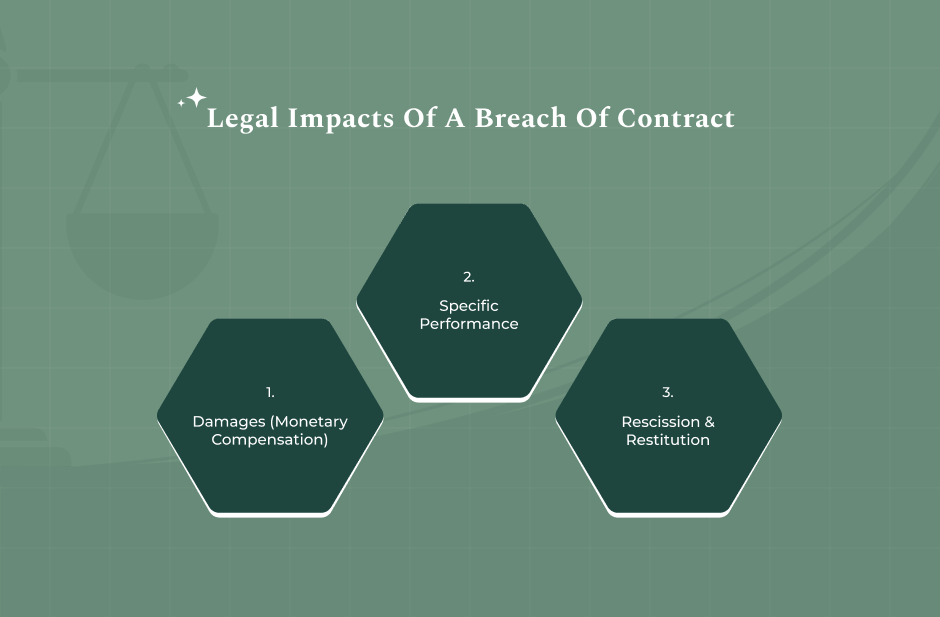
A breach of agreement can be hard and costly, but knowing what it means in law, its kinds, and what happens next can help you deal with this issue well.
Irrespective of whether you are a shop owner or an individual, knowing your rights and the need for clear deals can stop fights from getting worse.
When a breach occurs, the non-breaching party may pursue legal remedies:
1. Damages (Monetary Compensation): There are four major types of damages. These are as follows:
- Compensatory Damages: To cover direct losses.
- Consequential Damages: For indirect but foreseeable losses.
- Liquidated Damages: Pre-determined damages outlined in the contract.
- Punitive Damages: Rare, only awarded for malicious conduct.
2. Specific Performance: A court order requiring the breaching party to fulfill their obligations, often used in real estate or unique goods contracts.
3. Rescission & Restitution: Cancelling the contract and restoring both parties to their pre-contract position.
Read Also: What Is A Bilateral Contract? – Explained
Frequently Asked Questions (FAQs):
Now that you are aware of what a breach of contract is, here are some of the questions that people often ask related to contract breaches. So, take a look at them before you leave:
Not exactly. A contract is supposed to be in compliance with the legal standards for a valid agreement. Promises made casually (like saying you will give a friend a hand with the move) don’t make any sense to be counted.
Definitely, though spoken contracts are difficult to prove, they are permissible. By the Statute of Frauds, certain agreements (like real estate transactions) must be in writing.
• Look over the agreement that you have made.
• Gather evidence of the breach (emails, invoices, messages).
• Reach out to a lawyer first before you proceed with legal action.
The statute of limitations for breach of contract differs from state to state, and is mostly between 3 and 6 years for written contracts.
Yes, by the means of negotiation, mediation, or arbitration, which are more accessible in terms of cost and time than the process of litigation.








